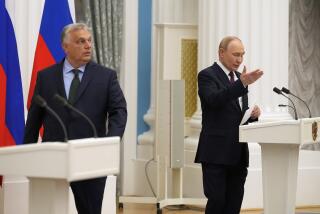On First Trip to Moscow, Elizabeth Gets Royal Treatment : Russia: The British queen has an enviable itinerary. But other events point up dangers in a troubled nation.
MOSCOW — The queen wore lavender blue, and appeared amused. Boris Nikolayevich folded his hands neatly into his lap like an oversized schoolboy on his very best behavior.
As Britain’s Queen Elizabeth II and Russia’s President Boris N. Yeltsin sat side by side chatting in the gold-and-cream splendor of the Kremlin’s Catherine Hall on Tuesday, the photographic flash power was sufficient to light up Siberia in December.
This is the queen’s first trip to Russia, and her itinerary is to die for.
In the first two days of her four-day visit, the monarch saw the hidden treasures of the Kremlin, attended the ballet “Giselle” at the Bolshoi Theater with President and Mrs. Yeltsin, strolled across Red Square, heard a Russian Orthodox choir harmonize under the golden domes of Assumption Cathedral and met the Orthodox patriarch.
She drove through Moscow in her own Rolls-Royce, shipped from London for the occasion, visited a Russian school and accepted a silver samovar made in the ancient metalworking city of Tula. Today the queen and her husband, the Duke of Edinburgh, leave for St. Petersburg.
Since the Russian media are less interested than their British counterparts in rumors of divorce in the House of Windsor, and more interested in the pomp and circumstance of a monarchy that outlasted their own, the trip has gone swimmingly.
Moscow made much of the symbolism of the visit by a queen whose grandfather called the last Russian czar, Nicholas II, “Cousin Nicky.” Yeltsin said the queen’s presence proved that Russia is on the road to democracy.
Although Russia has repudiated the Bolshevik revolutionaries who assassinated Nicholas in 1918, upheavals in the last two days have reminded Russians that their country is once again a troubled and dangerous place.
Shortly before the queen’s plane landed at Vnukovo airport Monday, an investigative reporter at Moscow’s largest daily newspaper was killed in a huge explosion after opening a booby-trapped briefcase.
A lawmaker announced that 27-year-old Dmitri Kholodov was to have testified before Parliament this week about alleged illegal arms trading by high-level Russian military officers stationed in Germany.
Colleagues said Kholodov picked up the briefcase at a train station, after being told by an anonymous caller that it contained incriminating documents on the subject, and took it back to the Moskovsky Komsomolets newsroom. Another reporter was injured in the blast.
Kholodov’s editors accused top military officials--specifically, Defense Minister Pavel S. Grachev--of complicity in the killing. Grachev indignantly denied the charge.
At a news conference Tuesday, the newspaper’s editor in chief, Pavel Gusev, announced that several days before Kholodov’s death, the reporter had visited a military base where organized crime groups had allegedly sent gangsters to be trained as hit men.
Kholodov had also written about alleged corruption in the Federal Counterintelligence Service, a successor agency to the KGB. Gusev said members of the armed forces general staff might also have wanted him dead.
Grachev, on a trip to Kaliningrad, said he believes Kholodov’s murder was politically motivated. But he called the accusations of military involvement an insulting attempt to rekindle anti-army hysteria and suggested that he may sue Gusev for slander, the Interfax news agency reported.
In other disturbing news this week, Russian counterintelligence authorities Monday seized 60 pounds of industrial-grade uranium that may have been destined to be smuggled into Iraq, local news agencies reported Tuesday.
Also Tuesday, trading on one of Moscow’s main stock exchanges was suspended after a bomb threat.
And even as the queen was being toasted Tuesday evening at a state dinner in the Kremlin’s Hall of Facets, the Echo Moscow radio station reported that Prime Minister Viktor S. Chernomyrdin had resigned.
Chernomyrdin’s press secretary immediately denied the story after talking with his “bewildered” boss.
More to Read
Sign up for Essential California
The most important California stories and recommendations in your inbox every morning.
You may occasionally receive promotional content from the Los Angeles Times.










